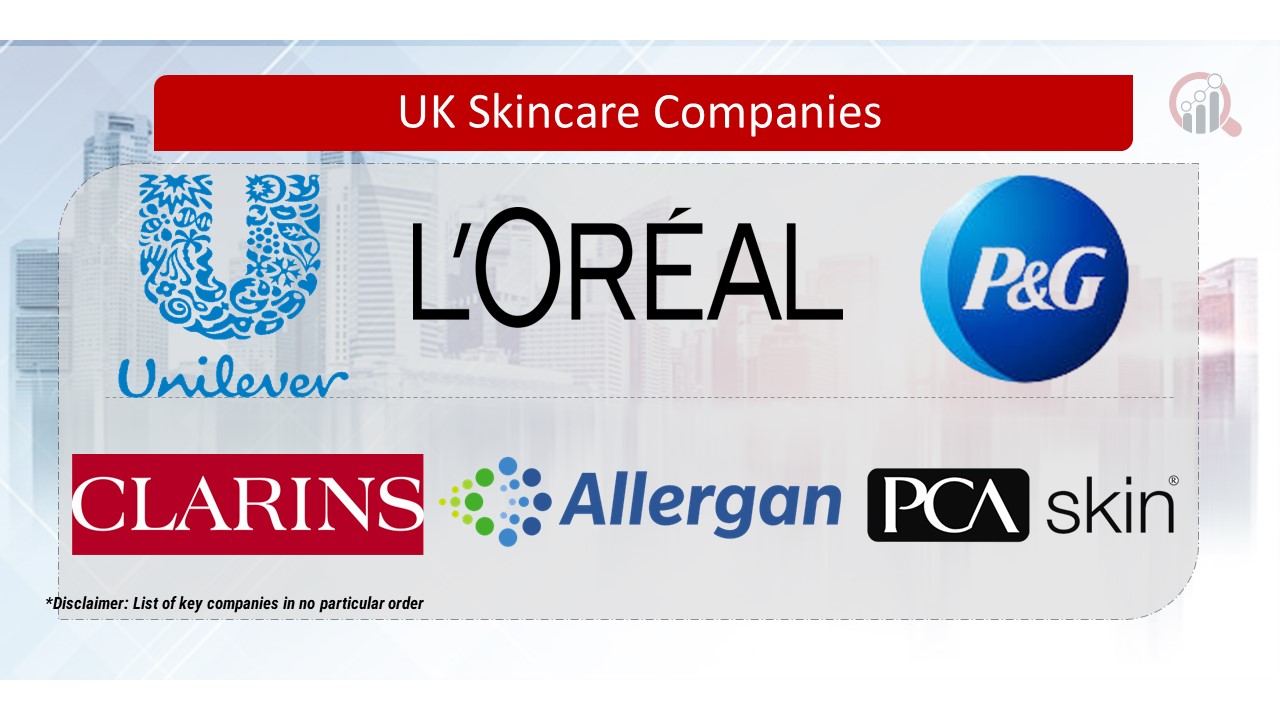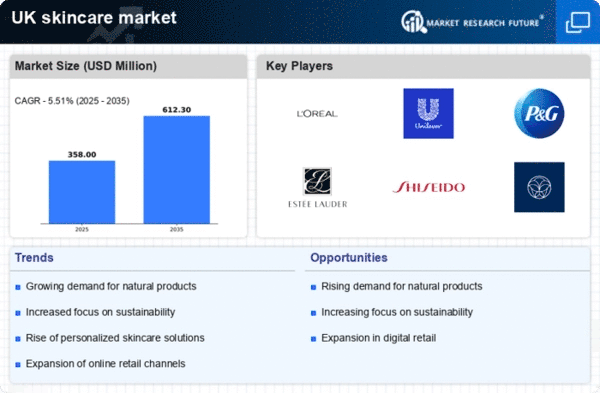Top Industry Leaders in the UK Skincare Market

The UK skincare market boasts a competitive landscape shaped by several key players striving to capture market share through diverse strategies. Among the prominent players, multinational corporations such as L'Oréal, Unilever, and Procter & Gamble dominate with their extensive product portfolios and established brand recognition. These industry giants leverage their vast resources to invest in research and development, marketing campaigns, and distribution channels, aiming to maintain their leading positions in the market. Additionally, niche brands like The Body Shop and Neal's Yard Remedies carve out their space by focusing on organic, cruelty-free products, appealing to environmentally conscious consumers.
Strategies adopted by companies in the UK skincare market vary but commonly revolve around product innovation, brand differentiation, and strategic partnerships. Many firms prioritize the development of scientifically advanced formulations, incorporating ingredients such as hyaluronic acid, retinol, and vitamin C to address specific skincare concerns effectively. Moreover, branding plays a pivotal role, with companies emphasizing their unique selling propositions, whether it's dermatologist-tested formulas, natural ingredients, or luxury packaging. Strategic collaborations with influencers, dermatologists, and retail outlets further enhance brand visibility and consumer trust.
Factors for market share analysis in the UK skincare market encompass a range of metrics, including revenue growth, market penetration, brand equity, and customer loyalty. Companies track sales performance across various distribution channels, including supermarkets, pharmacies, specialty stores, and e-commerce platforms, to assess their market reach and competitive positioning. Moreover, consumer feedback and market research provide insights into product preferences, emerging trends, and competitive threats, guiding companies in refining their strategies and product offerings.
In recent years, the UK skincare market has witnessed the emergence of new and innovative companies challenging established players. Startups like The Inkey List and Revolution Skincare disrupt the market with their affordable yet efficacious products, leveraging social media and influencer marketing to rapidly gain traction among younger demographics. These agile newcomers often excel in identifying untapped niches or addressing evolving consumer needs, posing a significant competitive threat to incumbents.
Industry news within the UK skincare market reflects a dynamic landscape characterized by mergers and acquisitions, product launches, regulatory developments, and shifting consumer preferences. For instance, recent trends highlight the growing demand for clean beauty products, prompting established brands to reformulate existing products or introduce new lines to cater to this trend. Furthermore, the increasing focus on sustainability and ethical sourcing drives companies to adopt eco-friendly practices throughout their supply chains, resonating with environmentally conscious consumers.
Current company investment trends in the UK skincare market underscore a significant emphasis on digitalization, innovation, and expansion into emerging markets. Companies allocate substantial resources to enhance their online presence, leveraging e-commerce platforms and social media channels to engage with consumers directly and drive sales. Moreover, investments in research and development fuel product innovation, with companies exploring novel ingredients, formulations, and delivery systems to stay ahead of competitors. Additionally, strategic acquisitions and partnerships enable companies to broaden their product portfolios, enter new markets, and strengthen their competitive position in the global skincare industry.
Overall, the competitive scenario in the UK skincare market remains robust, with established players, niche brands, and emerging companies vying for market share through a combination of product innovation, branding strategies, and strategic alliances. As consumer preferences continue to evolve, companies must adapt swiftly to capitalize on emerging trends, differentiate their offerings, and maintain relevance in an increasingly competitive landscape.
UK Skincare Industry Developments
-
Unilever: Their body wash under the Dove name was redesigned in April 2023 with a hypoallergenic alternative and plant-based components. This satisfies the growing demand for clean beauty products from consumers. -
Cult Beauty: launched the Necessaire brand in January 2022 in the United Kingdom. Lotions, cleanser, and serums are just a few of the many body care items available under this brand.
Key Companies in The Skincare Market Include –
- Clarins
- Unilever Plc
- Allergan (SkinMedica)
- L'Oreal S.A.
- Procter & Gamble Company
- Environ Skin Care (Pty) Ltd.
- PCA Skin
- SkinCeuticals
- The Estee Lauder Companies Inc.
- Cult Beauty











